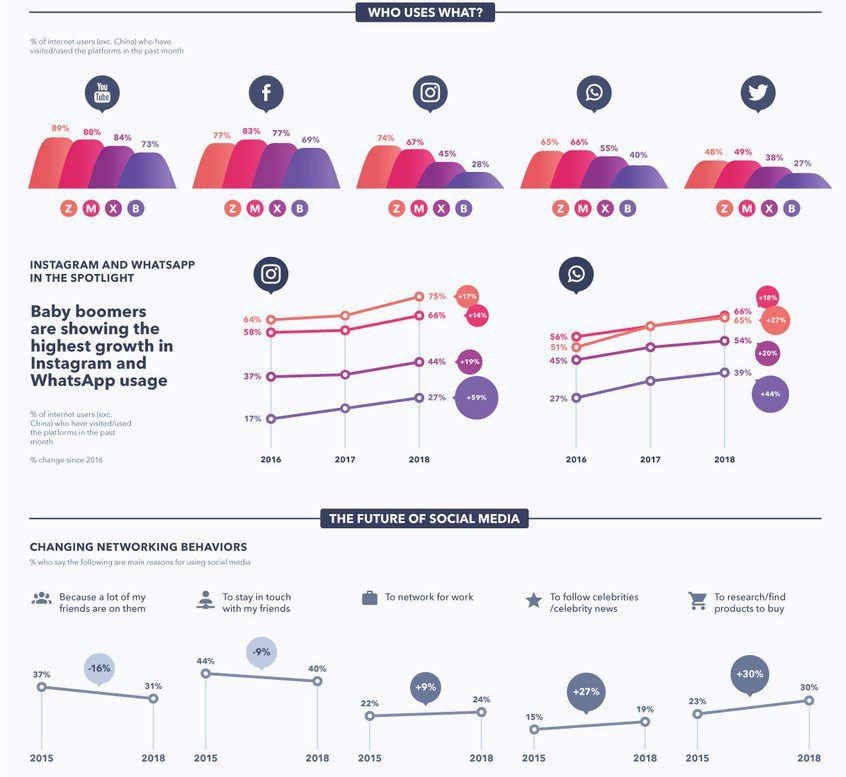Remember the days of pulling your business plan together?
From developing your offer to understanding your breakeven point and deciding on your exit strategy. So much goes into getting your ideas down on paper, but what’s often overlooked is the very thing that keeps you in business, the people who buy your products or services.
It goes without saying that knowing your customers is a crucial part of business success and thanks to cross-generational digital marketing it is now easier to identify and understand your target audiences.
Even if you have the best products or services on the market, you still need to identify the right audience for it. That’s why factors like gender, age and location are important for your market research. Successful companies have used these traits to identify their target market but you can narrow it down further by utilising generational marketing in reaching your audiences. Trouble finding the right audience and quality content? Check out copywriting services.
For example, if your brand’s target audience is women in Melbourne, there are still differences between women in their early 20s and women in their early 40s. Aside from the age gap, their respective generations experienced different things that shaped their perspectives and attitudes as consumers too. Understanding the key traits of both groups will allow you to reach each generation more effectively.
This is what generational marketing is all about.
What is generational marketing?
Generational marketing is a strategy for understanding how a certain age group behaves as consumers by considering their upbringing shaped by trends, developments and events.
There are currently four generations leading the market:
- Baby Boomers (born between 1946 to 1964)
- Gen X (born between 1965 to 1980)
- Millennials (born between 1981 to 1996)
- Gen Z (born between 1997 to 2012)
Each of these four generations has specific preferences that your product or service and marketing need to address. It makes sense that their consumer behaviours are often shaped by the society they grew up in.
Why is generational marketing important for your brand?
Utilising generational marketing will give you a better understanding of your audience, allowing you to engage with them effectively and increase brand awareness.
Marketing is not a one-size-fits-all approach, instead of focusing on just one group, you can expand your reach to a wider audience. Building diversity in your brand with cross-generational marketing allows you to increase return on investment with content while developing customer loyalty.
You can optimise your social media as well as your marketing campaigns to make them more effective for different generations. Segmenting your content to the relevant audience will increase conversion and improve communication if your message directly addresses their needs.
How you can market your content to each generation
The most difficult part about generational marketing is avoiding cliches and stereotypes. If you’re not careful, you can do more harm than good.
The most common stereotypes that you should avoid include:
- Baby boomers are technophobes.
- Gen Xers are apathetic and cynical.
- Millennials are lazy and detached.
- Gen Z or Zoomers are over-sensitive and demanding.
Nobody wants to be defined by their generation’s negative stereotypes so take note of these before making sweeping generalisations in your content.
You need to look beyond cliches when creating content. Most customers, regardless of age, want authenticity in their content and they can easily identify if a piece of content is pandering to or patronising them.
It’s important to focus on their attitudes and preferences as consumers backed by market research. Generations have their preferences in communication channels, content type, sales tactics and technology.
Some generations spend more time on social media; there are some with more spending capacity. According to this chart, Baby Boomers are showing great interest in Instagram and WhatsApp but Facebook remains their most preferred platform.

Gen Xers spend more time on social media compared to Boomers but less than Millennials and Zoomers. Social media is also used by generations in buying or researching products, with Millennials and Zoomers interacting with brands the most.
The good news is that there are some similarities. All generations prefer personalised communication from brands they follow, with email as the communication channel of choice for most generations. It is the current top choice for Millennials, Boomers, and Gen X. Gen Z puts email second after social media.
Mobile usage is common among the generations so text messages are an effective marketing platform too.
As for media platforms, Facebook and Youtube are the most visited websites for every generation.
Once you have a good grasp of each generation’s preferred communication channels, you can focus on understanding their traits and attitudes to develop your content marketing strategies.
1. Baby Boomers
Baby boomers are most responsive to traditional marketing (e.g. television, radio and print) but contrary to stereotypes, they are embracing modern technology.
While they’re open to new gadgets and the internet, you should be careful when marketing to them. Using slang or abbreviations might confuse them so it’s best to be direct and clear when addressing this generation. As much as possible, avoid age-focused content and saying the word “old.”
They have the most purchasing power among all generations and they are loyal to the brands they support. When it comes to content, simple and valuable information about your products will help them in their purchase decisions.
2. Gen Xers
Gen Xers are financially stable compared to Millennials and Zoomers since most of them are in the prime of their careers. Because of this—and the fact that they grew up during several recessions—they are cautious with their purchases and they want the best value for their money.
Gen Xers are also tech-savvy and most of them know how to navigate new technology. But just like Boomers, they can be confused about new apps, technology and websites. Social media is popular among Gen Xers too, they have the biggest population on Facebook—dethroning Millennials—with over 82% users.
In terms of shopping, Gen Xers enjoy the best of both worlds: they enjoy in-store and online shopping.
Traditional marketing still works for Gen Xers but they are also responsive to modern strategies like email marketing, social media and customer service offers. Loyalty programs as well as providing coupons and discounts will win them over because they love receiving added value and benefits to their purchases.
3. Millennials or Gen Y
Millennials are the most targeted by brands because they are currently the biggest market among generations. Since they grew up with modern technology and social media, Millennials’ purchase decisions are influenced by recommendations from peers and the internet.
They are unresponsive to traditional marketing methods except for word-of-mouth. Most millennials check reviews before buying a product, which is why blogs are a popular content marketing initiative to target them.
Researching is important for Millennials; so if you want them to buy from you, back up your products with customer reviews on your official channels and website.
Millennials value social causes and authentic experiences. They care about brands that share the same ideologies and values. They take the time to learn about company ethics and practices.
Content-wise, this generation is responsive to user-generated content, content marketing, social media marketing and multichannel marketing.
4. Gen Z or Zoomers
The new kids on the block are Generation Z or simply “Gen Z”. They might be the youngest but they are the most diverse generation yet. They are not far behind Millennials when it comes to population; they are expected to take over their predecessor in terms of income by 2030, with an estimated $33 trillion by that time.
Even if they’re also tech natives, Zoomers are realists. They can see through “too good to be true” offers and they can sense if a brand is inauthentic. Like Millennials, Zoomers care about social causes and they support brands that are geared towards positive changes and diversity.
If there’s one thing that Zoomers love, it’s visual content. Short-form video platforms like Tiktok boomed because of Zoomers. Apps like Instagram adjusted to the short-form video hype by adding in reels, so you can use this feature to market to Zoomers. Long-form videos are still welcome for Zoomers since they turn to YouTube for entertainment as well.
Text-heavy content will not attract Zoomers that much but they are keen on learning new information through “bits and pieces” type content. For businesses, this means you should make your content snappy, highlighting digestible and entertaining information. You can use memes to get their attention too.
Influencer marketing works for Zoomers but they value individuality. Even if they see their favourite celebrities endorsing a product, they will also research the item and company to see if it’s something they can get behind.
Generations have many things in common that businesses should take note of. Personalised communication and authenticity are highly favoured by all generations—no matter what platform they’re using.
You can use generational marketing as a strategy to build your audience and increase brand awareness. Conducting extensive research on each generation will enable you to understand your target customers and ensure that you avoid negative stereotypes and pitfalls when creating content.
Want to create an inclusive and effective generational marketing strategy for your business? Get in touch with us.

